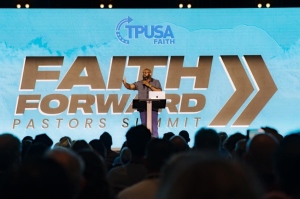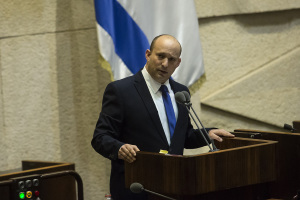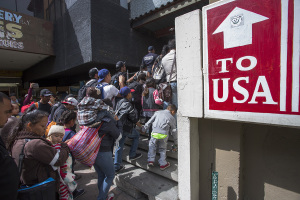Asian American Christian Leaders Call on Evangelicals to Higher Standard After 'Repeated and Offensive Racial Stereotyping'
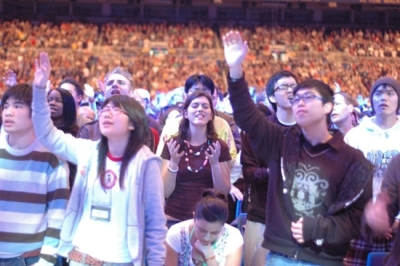
Asian-American Christian leaders have invited evangelicals to engage in "dialogue and conversation" after two recent public incidents highlighted what the group calls "the repeated and offensive racial stereotyping of Asian-Americans."
"From VBS curriculum, to youth skits, to general Christian trade books, Asians have been caricatured, mocked, or otherwise treated as foreigners outside the typical accepted realm of white evangelicalism. And the situation has not improved over time," wrote the Asian American community leaders in an open letter addressed to the "Evangelical Church."
"We are a part of the body, we are North American Christians every bit as much as any other North American Christian, and we are weary, hurt, and disillusioned by the continuing offensive actions of our fellow brothers and sisters in Christ," the letter continued.
The letter comes several weeks after Saddleback mega-church pastor Rick Warren posted a smiling Red Guard member Communist propaganda image on Sept. 23, captioned "The typical attitude of Saddleback Staff as they start work each day."
After Asian-American leaders commented on the image and shared how it evoked personal painful memories and pejorative stereotypes, Warren deleted it and offered his apologies.
"Staff handed me a hard copy of an email from someone offended by a picture I posted. If you were hurt, upset, offended, or distressed by my insensitivity I am truly sorry. May God richly bless you," he wrote on Sept. 25.
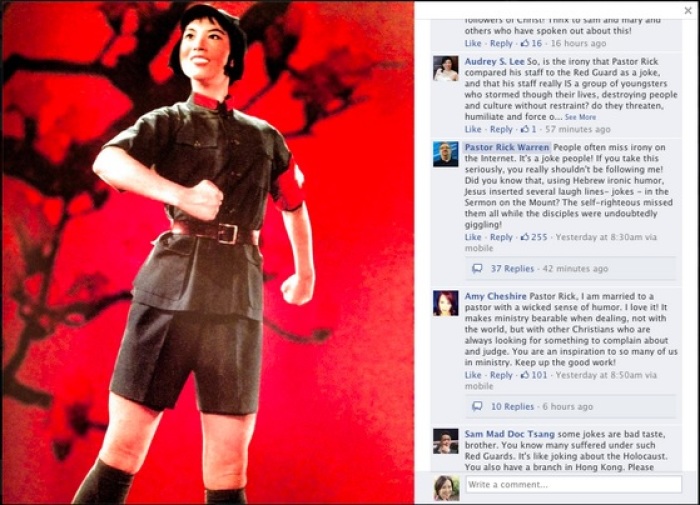
Last week, one session at the Saddleback Church-hosted Exponential Conference featured a video depicting the relationship between a pastor and his assistant. In an apparent parody of "The Karate Kid," the video included a white man speaking with Chinese accent, karate and the two actors bowing to one another.
After organizers of the Exponential Conference realized the video had raised the ire of some Asian-American attendees and discussion in the blogosphere, Exponential Director Todd Wilson and President Dave Ferguson convened Asian-American church leaders, Ray Chang, DJ Chuang, Daniel and Jeya So and Brian Chan to hear their perspectives and apologize for airing the video.
After one of the leaders shared about how the video had brought back painful childhood memories, conference organizers had the chance to understand the hurt the video caused.
"This story was eye-opening for me," Ferguson said in a blog post on the conference website. "We all have pain points that are often unintentionally triggered. I realized how for many people the scene in that video cut deep. I gained new and helpful insights into some of my own blind spots."
The message of the open letter is meant to address a much larger, systemic problem between the Asian-American community and the evangelical church than just the recent Facebook post and "Karate Kid" video, said Intervarsity Regional multiethnic ministries director, Kathy Khang.
"It's much deeper than trying to make a joke out of the Karate Kid, this is complicated history and a relationship with generational immigrant churches and kids being raised up trying to find a place in America, cultural, and ethnic identity," she said, also adding that missteps made in the history of overseas missions to east Asia had also played a role.
Prior to the release of the letter, many of its close to 100 signatories had been "in conversation for over a decade" discussing their frustrations with what they deemed "cultural appropriation" in the church — Christian publishers and organizers taking stereotypical elements of Asian culture and incorporating it into anything from VBS curriculum to skits performed at church conferences.
Khang said that she hopes the letter's readers will "recognize this isn't just about a group of Asian-American Christians upset about a joke," but that it will be an opportunity for individuals to reflect on the diversity of the church.
"This isn't about being politically correct. This is not trying to use language so that we have to tippy toe around each other, but using language that actually is honoring and a blessing it to each other instead of words that are meant to put one another up."
Khang said that although some Christians accuse Asian Americans of putting their ethnicity ahead of the Gospel, particular language and stereotypes only inhibit how the Gospel is shared.
She wonders how the Gospel can be shared effectively if messages are used "that exclude an entire group that we say are a part of God's family."
"What I hear is that my culture, my language, and who I am as God created me to be, doesn't matter, and that actually, it should be, secondary to a more majority culture type of Christianity," Khang explained.
The letter focuses primarily on educating the Church and institutions about racial stereotyping and investigating any barriers that may be holding Asian Americans back "from having a presence and a voice in the evangelical world," said Khang and others.
















